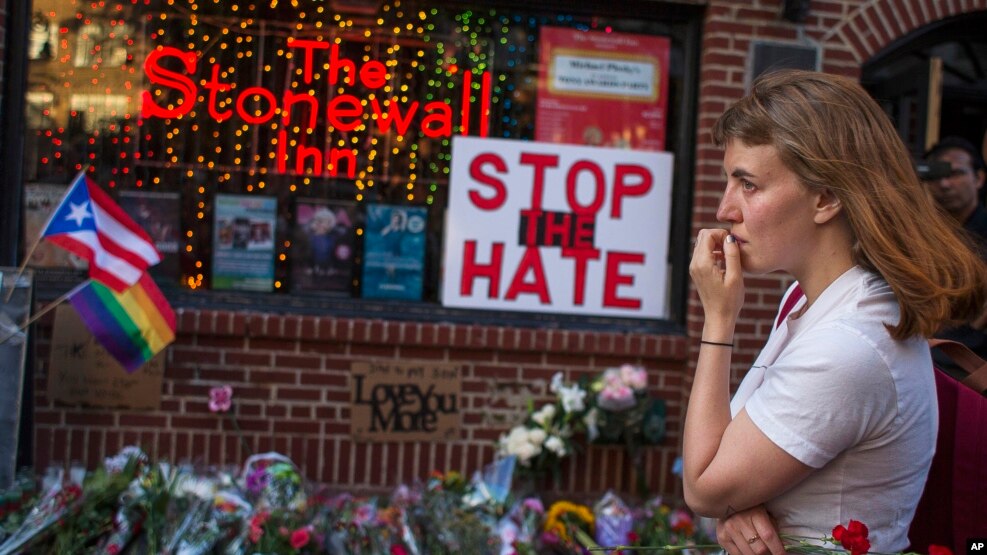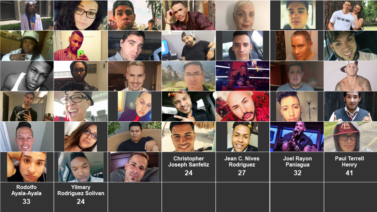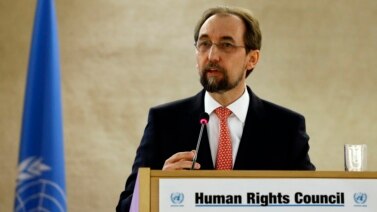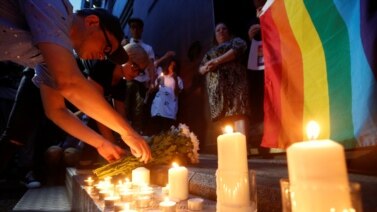
As Orlando continues to mourn the 49 victims of Sunday's mass shooting, new information about the shooter has led to new questions about his possible motives.
Addressing Americans after the massacre at Pulse, a popular gay nightclub, U.S. President Barack Obama called the tragedy “an act of terror and an act of hate.”
The FBI confirmed the shooting is being investigated as an act of terror. It said it had investigated the gunman, Omar Mateen, in 2013 and 2014 for having suspected ties to terrorist groups.
FBI investigators said he told co-workers he had family connections to Al Qaeda. He also claimed membership in the Shi'ite militant group Hezbollah.
During the Orlando attack, the FBI said Mateen pledged allegiance to Islamic State during calls to police. He also mentioned the Boston Marathon bombers and a man who carried out a suicide attack in Syria.
“It's not entirely clear at this point just what terrorist group he aspired to support,” FBI Director James Comey said.
A different motive
President Obama called the attack an apparent example of “homegrown extremism.” But he also said it was “relevant” that the shooter targeted a club used by the lesbian, gay, bisexual and transgender (LGBT) community
The Orlando attack came during June, which is dedicated as U.S. Pride Month in the LGBT community. During the month, LGBT people hold major festivals and celebrations across the U.S.
On Monday, Obama said extremists with a “perverted” view of Islam have consistently targeted the gay and lesbian community, “because they believe they do not abide by their attitudes towards sexuality,” Obama said.
He added that even though groups like Islamic State condemn homosexuality, they think it is fine to take women captive, enslave them and rape them.
“There clearly are connections between the attitudes of an organization like this and their attitudes towards tolerance and pluralism,” Obama said. “And a belief that all people are treated equally, regardless of sexual orientation - that is something threatening to them.”
Some news reports have quoted investigators as saying they are looking into whether Mateen visited Pulse nightclub prior to the night he launched the attack.
An official with knowledge of the investigation told the Associated Press that people reported seeing Mateen and his wife at the nightclub on a prior occasion. The unnamed official said investigators had talked to the wife and will also use data from Mateen's phone to try to verify whether he had visited before.
The Los Angeles Times quoted multiple witnesses as saying the gunman had attended the nightclub before and had used a gay dating app. One of the witnesses who said he chatted with Mateen on the gay app told the newspaper he saw him near the nightclub about one hour before the shooting.
Mateen's father, Seddique Mateen, spoke to reporters Tuesday about the latest reports. He said his son was not gay. He added that he never saw any homophobic behavior in his son, except for one time in Miami when Mateen expressed disgust at the sight of two men kissing.
Mateen's ex-wife told CNN on Tuesday that she is not sure if her former husband had any homosexual tendencies. Sitora Yusufiy said Mateen “did feel very strongly about homosexuality.”
Presidential candidates express support for gay community
During a speech Monday, Republican presumptive presidential nominee Donald Trump mentioned the LGBT community when commenting on the Orlando attack.
“Our nation stands together in solidarity with the members of Orlando's LGBT community,” Trump said, after observing a moment of silence for the victims. “This is a very dark moment in America's history. A radical Islamic terrorist targeted the nightclub not only because he wanted to kill Americans, but in order to execute gay and lesbian citizens because of their sexual orientation.”
Trump's Democratic rival, Hillary Clinton, spoke directly to the community in a message after the massacre.
“To the LGBT community: please know that you have millions of allies across our country. I am one of them. We will keep fighting for your right to live freely, openly and without fear. Hate has absolutely no place in America,” Clinton said.
The Florida chapter of the Council on American-Islamic Relations (CAIR) was quick to condemn the Orlando attack. The group's executive director, Nihad Awad, called the act “a hate crime, plain and simple.” He said his organization has “no tolerance for extremism of any kind.”
“For many years, members of the LGBT community have stood shoulder-to-shoulder, with the Muslim community, against any acts of hate crimes, Islamophobia, marginalization, and discrimination. Today we stand with them, shoulder-to-shoulder,” Awad said.
Terrorism expert and author Mia Bloom spoke to Public Radio International on the difficulty of understanding the motives for extremist violence.
“I don't know if part of the homophobia is an extreme interpretation of his own sexual repressedness,” said Bloom, a professor at Georgia State University.
“This is not someone who grew in Pakistan or Saudi Arabia. This is someone who grew up in the United States, watching TV, being exposed to things like Will and Grace. This is not someone who's never seen two gay people kiss before, especially if he's hanging out at clubs with people who are cross-dressing.”
Bloom added: “I think that [Obama] was very on point as far as saying that it doesn't have to be one thing at the exclusion of others. It was definitely a hate crime, and it was an act of terrorism.”
I'm Bryan Lynn.
Bryan Lynn wrote this story for VOA Learning English. Additional information came from the Associated Press and Reuters. Hai Do was the editor.
Write to us in the Comments section, and visit our Facebook page.
Words in This Story
massacre - n. the violent killing of many people
homegrown - adj. belonging to one's own locality or country
relevant - adj. current, having to do with the matter at hand
perverted - adj. correct and suited for a specific purpose
pluralism - n. a system in society where minority groups main their cultural traditions
app - n. a computer application mostly used on a mobile device
homophobic - adj. having a dislike or prejudice against homosexuals
solidarity - n. unity in feeling or actions
marginalization - adj. to be kept powerless or not important
repressed - adj. stopped from being expressed or remembered
exclusion - n. the state of being kept out of


